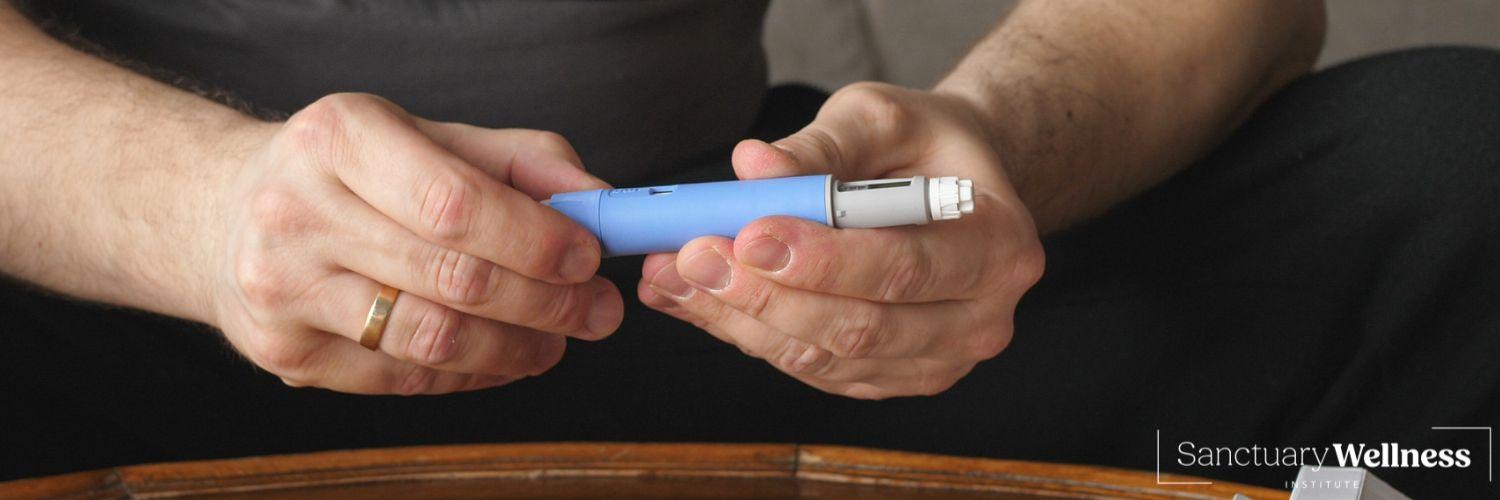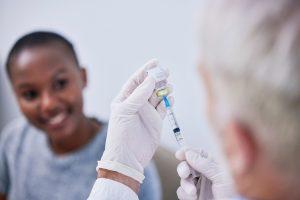Why We Recommend Against Microdosing GLP-1s
- Nicholas DiBella
- Published: January 3, 2025
- Updated: April 23, 2025
- Fact-checked by Dr. Desiree Granados

In recent years, the concept of “microdosing” has gained popularity across various health and wellness fields, and now the trend has reached GLP-1 medications like semaglutide. In light of the growing curiosity about microdosing, our expert, Dr. Granados, has weighed in to provide clarity and guidance.
Let’s explore what microdosing GLP-1 medications entails, why it’s gaining attention, and the potential risks involved.
The Microdosing Trend
Microdosing is the practice of using minimal amounts of a substance rather than standard doses. People often microdose to experience the subtle effects of a substance, gradually ease into its use, or taper off from it. Originally associated with psychedelics like LSD or psilocybin, the microdosing trend has expanded to include substances like THC/marijuana, antidepressants, and now GLP-1 medications such as semaglutide and tirzepatide.
Dr. Granados defines the growing trend of microdosing GLP-1 medications as “someone taking a lower dose (and commonly at more frequent intervals) than the currently approved doses of these medications.”
Although many hope to achieve better results by microdosing their GLP-1 medication, Dr. Granados warns the public to be cautious. She says, “this off-label practice is gaining attention despite the lack of formal guidance or extensive clinical studies supporting it.” Next, we’ll explore the pro’s and con’s of microdosing GLP-1s.
Can You Microdose GLP-1 Medications?
While it is certainly possible to microdose GLP-1 medications, it’s important to proceed with caution. The most common reasons why people microdose GLP-1s include:
- Perceived Effectiveness: Anecdotal reports suggest that microdosing may help some individuals achieve and maintain weight loss more effectively than standard dosing.
- Attempting to Lose Weight Gradually: Some choose to microdose to lose weight more gradually, hoping to avoid sagging skin caused by rapid weight loss.
- Cost Savings: GLP-1 medications can be expensive, and using smaller doses could stretch a prescription further.
- Reducing Side Effects: Some users report that microdosing minimizes common side effects of semaglutide like nausea, vomiting, and diarrhea.
However, Dr. Granados warns that microdosing GLP-1s lacks scientific backing: “This recent trend is only based on anecdotal data that suggests microdosing is more effective in some individuals achieving and maintaining weight loss, thereby minimizing side effects and reducing cost of therapy. However, there is no scientific data supporting this approach.”
Without robust clinical evidence, it’s difficult to determine whether microdosing offers significant advantages or introduces unnecessary risks.
In response to the supposed benefits of microdosing GLP-1s, here are some counterarguments to consider:
- Results: There is no evidence that microdosing GLP-1 medications yield better results than taking your prescribed dosages.
- Avoiding Rapid Weight Loss: Ask your doctor about starting with a lower, but recommended dose (no need to microdose!) Also consider a protein-rich diet and proper hydration, which can also help prevent issues like sagging skin from rapid weight loss.
- Costs: Concerned about costs? Talk to your doctor about alternative medications or compare prices at other weight loss clinics before altering your prescribed dosage.
- Side Effects: Initial side effects are common, but often subside within a few months as your body adjusts to the medication.
Risks of Microdosing GLP-1s
While the concept of microdosing may seem appealing, it comes with risks. These include:
1. Inconsistent Absorption
Microdosing can lead to inconsistent absorption of the medication, as the body may not metabolize smaller doses as predictably as standard doses. This inconsistency can result in fluctuating blood levels of the drug, potentially reducing its efficacy.
2. Dosage Errors
Administering smaller doses than intended can be challenging, especially when using prefilled injection pens.
Dr. Granados elaborates: “The risk of microdosing is mostly associated with the general risk attached to the use of compounded and ‘less regulated’ drugs. Additionally, when using one of the approved delivery devices for GLP-1 medication, microdosing will require counting clicks in a pen or extracting the drug with a syringe. Hence, overdosing or product contamination become concerns.”
3. Unknown Long-Term Effects
Since microdosing GLP-1 medications is not a standard practice, there is little to no research on the long-term effects. This uncertainty adds another layer of risk for individuals experimenting with this approach.
Bottom Line: Should You Microdose Semaglutide or Other GLP-1s?
Ultimately, the decision to microdose GLP-1 medications should not be taken lightly. While some anecdotal evidence suggests potential benefits, the lack of clinical data and regulatory approval makes this practice risky.
Dr. Granados emphasizes the importance of medical oversight: “I personally try to steer clear of non-approved uses of medications or at least wait until solid clinical evidence becomes available.”
If you are considering microdosing GLP-1 medications, consult with a healthcare provider first. In short, we recommend adhering to approved dosing guidelines for your semaglutide or other GLP-1 medication skipping the microdose approach.
How we reviewed this article:
- Sean Wharton et al. (2021). Managing the gastrointestinal side effects of GLP-1 receptor agonists in obesity: recommendations for clinical practice
https://www.tandfonline.com/doi/full/10.1080/00325481.2021.2002616
Current Version
April 23, 2025
Written By
Nicholas DiBella
First Published
January 03, 2025
Written By
Nicholas DiBella
Fact-checked By
Dr. Desiree Granados
Editorial Process
Our Editorial Process

Nicholas DiBella received his psychology degree from West Chester University of Pennsylvania and has been writing content for the Sanctuary Wellness Institute since 2023. He is passionate about all things health & wellness.







